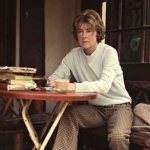... worn out like this, and crippled by brain-fag;
Obsessed first by one person, and then
(Almost at once) most horribly besotted by another;
These Februaries, full of draughts and cracks,
They belong to the people in the streets, the others
Out there – haberdashers, writers of menus.
Salt breezes! Bolsters from Istanbul!
Barometers, full of contempt, controlling moody isobars.
Sumptuous tittle-tattle from a summer crowd
That’s fed on lemonades and matinées. And seas
That float themselves about from place to place, and then
Spend hours – just moving some clear sleets across glass stones.
Yalta: deck-chairs in Asia’s gold cake; thrones.
Meanwhile ... I live on ... powerful, disobedient,
Inside their draughty haberdasher’s climate,
With these people ... who are going to obsess me,
Potatoes, dentists, people I hardly know, it’s unforgivable
For this is not my life
But theirs, that I am living.
And I wolf, bolt, gulp it down, day after day.



















Comment form: